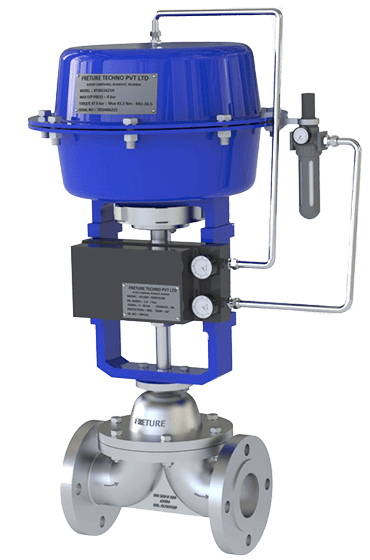Pneumatic diaphragm control valves play a crucial role in regulating fluid flow in industrial processes. These valves are widely used in industries such as oil & gas, pharmaceuticals, water treatment, and chemical processing, where precision, reliability, and automation are essential. With their ability to provide accurate flow control while minimizing energy consumption and maintenance costs, these control valves have become indispensable components in modern industrial setups.
What is a Pneumatic Diaphragm Control Valve?
These control valve is a type of valve that uses compressed air to actuate a diaphragm, which in turn regulates the fluid flow. This control mechanism ensures smooth and precise adjustments in pressure and flow rates, making these valves ideal for automated systems. The key components of these control valve include:
Diaphragm: A flexible membrane that responds to air pressure variations.
Actuator: Converts pneumatic signals into mechanical movement.
Valve Body: The main housing that directs and controls the fluid flow.
Positioner (Optional): Enhances control precision by adjusting the diaphragm’s movement based on input signals.
Depending on the operational requirements, these valves can be direct-acting (where the diaphragm opens the valve) or reverse-acting (where the diaphragm closes the valve).
 |
| Pneumatic Actuator Diaphragm Control Valve Manufacturer in India |
Key Features and Advantages
1. High Precision Flow Control : These control valves are designed to modulate flow with high accuracy. They provide fine control over process variables, ensuring stability and efficiency in industrial operations.
2. Durability and Corrosion Resistance : Manufactured using robust materials such as stainless steel, PTFE, or elastomers, these valves can withstand harsh industrial environments, including exposure to corrosive chemicals and extreme temperatures.
3. Low Maintenance Requirements : Unlike electrically operated valves, pneumatic diaphragm control valves have fewer moving parts, resulting in minimal wear and tear. This extends the lifespan of the valve and reduces the need for frequent maintenance.
4. Energy Efficiency : Since these valves use compressed air instead of electricity, they contribute to lower operational costs. Their efficiency makes them a preferred choice for industries looking to optimize energy consumption.
5. Leak-Proof Design : The diaphragm mechanism ensures a tight seal, preventing leakage and ensuring safe operation, particularly in hazardous environments where fluid containment is critical.
Types of Diaphragm Control Valves
Depending on application needs, different types of pneumatic diaphragm control valves are available:
Globe Control Valves: Ideal for precise flow modulation in various industrial applications.
Angle Seat Valves: Suitable for high-pressure environments where durability and responsiveness are required.
Three-Way Control Valves: Used for mixing or diverting flows in process industries.
Sanitary Diaphragm Valves: Specifically designed for pharmaceutical and food industries, ensuring hygienic fluid control.
Applications Across Industries
These control valves are extensively used across multiple industries due to their reliability and versatility:
Pharmaceutical Industry: Used in sterile environments to regulate fluid flow in drug manufacturing processes.
Chemical Processing: Capable of handling aggressive chemicals while maintaining operational safety.
Water Treatment Plants: Helps in regulating pressure in filtration and distribution systems.
Oil & Gas Sector: Plays a critical role in controlling steam, gas, and fluid movement in pipelines.
Choosing the Right Diaphragm Control Valve
When selecting these control valve, it is essential to consider the following factors:
Pressure and Temperature Ratings: Ensure that the valve meets the operational requirements of the application.
Compatibility with Process Fluids: The valve material should be resistant to the fluid type being controlled.
Automation Integration Capabilities: Some systems may require smart positioners for enhanced control.
Compliance with Industry Standards: Look for valves certified under ISO, FDA, or other relevant standards to guarantee quality and safety.
These control valves are essential for ensuring efficient and precise fluid control in industrial applications. Their ability to provide leak-proof performance, durability, and energy efficiency makes them a preferred choice for industries requiring high-performance flow control solutions. Investing in high-quality pneumatic diaphragm control valves can lead to improved system performance, reduced downtime, and enhanced operational safety.
No comments:
Post a Comment